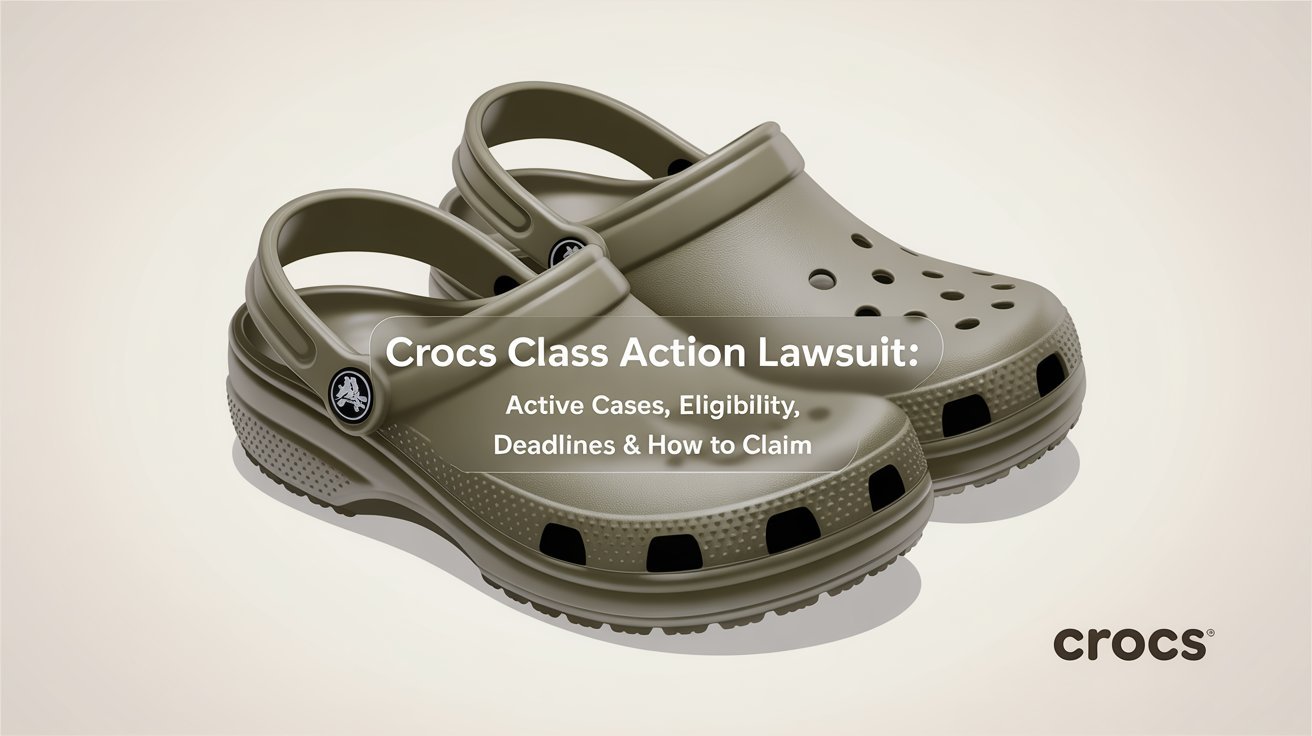The phrase “Crocs class action lawsuit” has been appearing more often in legal news over the past couple of years. Once known mainly as a quirky but comfortable footwear brand, Crocs, Inc. has found itself at the center of several legal disputes spanning consumer rights, securities, and employee wage issues. These cases highlight broader concerns about product durability, pricing practices, investor transparency, and fair labor treatment.
In this article, we will dive deep into all the active Crocs class action lawsuits as of 2025, explain who is eligible to participate, outline key deadlines, and discuss how affected individuals can potentially file claims. Whether you are a consumer who purchased Crocs, an investor in the company’s stock, or a former employee, this comprehensive guide will help you understand your rights and the current legal landscape surrounding Crocs.
The Rise of Crocs Lawsuits
Class action lawsuits are designed to let large groups of people with similar claims band together and seek relief against a company. In the case of Crocs, these lawsuits stem from very different corners:
- Consumers claim Crocs failed to disclose product defects and used deceptive marketing practices.
- Investors allege securities fraud tied to misleading statements about financial health.
- Employees have brought wage-and-hour claims, seeking fair pay and compliance with California labor laws.
Together, these lawsuits paint a complex picture of a company facing scrutiny on multiple fronts.
Consumer Class Actions: Shrinkage and Phantom Discounts
Shrinkage and Warping in Heat
One of the most prominent Crocs class action lawsuits comes from consumers who allege their shoes shrink or warp when exposed to ordinary heat, sunlight, or even water. Plaintiffs argue that Crocs failed to disclose this material limitation and continued to market its shoes as durable for everyday use.
In Mongalo et al. v. Crocs, Inc., a federal judge in California recently ruled in June 2025 that parts of the case can proceed. While certain fraud-based claims were dismissed, the failure-to-disclose theory remains alive, meaning Crocs could still be held accountable if it is proven that the company knew about the shrinkage defect but did not warn consumers.
This ruling comes after a different shrinkage lawsuit ended in summary judgment for Crocs earlier in 2025, where the court found insufficient grounds to proceed. However, that case does not preclude success in Mongalo, which is moving forward on narrower claims.
“Phantom Discount” Pricing Practices
In addition to product defects, Crocs also faces a “phantom discount” lawsuit filed in California in June 2025. Shoppers allege Crocs advertised inflated “regular prices” online, only to slash them with supposed discounts, making customers believe they were getting bigger bargains than they actually were.
This type of lawsuit challenges reference pricing, a practice increasingly scrutinized under state consumer protection laws. If successful, it could result in refunds or injunctive relief, requiring Crocs to alter how it markets discounts on its website.
Investor Class Action: CROX Securities Lawsuit
Crocs is also facing a securities class action lawsuit filed in January 2025 in the U.S. District Court for the District of Delaware. Investors allege that Crocs misled the market between November 3, 2022, and October 28, 2024, particularly regarding the integration of its HEYDUDE acquisition and related financial health.
The complaint argues that Crocs failed to properly disclose overstocking problems and slowing consumer demand, causing investors to purchase shares at artificially inflated prices. When the truth allegedly came to light, stock prices fell, resulting in substantial losses.
Although the lead plaintiff deadline passed in March 2025, the case remains active, and investors within the class period may still be automatically included unless they choose to opt out. If a settlement or judgment occurs, eligible shareholders could recover damages based on their trading records.
Employee Wage and Hour Cases
California Retail Settlement
Beyond consumers and investors, Crocs’ own employees have also taken legal action. In Acevedo et al. v. Crocs Retail, LLC, hourly non-exempt retail workers in California reached a proposed $1 million settlement covering the period between January 2019 and December 2024.
The claims included failure to provide meal and rest breaks, unpaid wages, and other California Labor Code violations. The settlement is non-reversionary, meaning funds will be distributed to employees rather than returning to Crocs, with payments based on the number of weeks worked. Importantly, it also includes penalties under California’s Private Attorneys General Act (PAGA), a statute that allows employees to sue for labor violations on behalf of the state.
Overtime Pay Dispute in 2025
In August 2025, a new wage-and-hour lawsuit was filed, alleging that Crocs improperly calculated overtime pay by excluding bonuses and shift differentials from the regular rate of pay. This case is still in its early stages but could grow into another significant class action if certified.
Who Is Eligible to Participate?
The eligibility requirements for each Crocs class action lawsuit vary:
- Consumers (Shrinkage Case): Individuals who purchased certain Crocs models and experienced shrinkage or warping. Proof of purchase or product photos are often helpful.
- Consumers (Phantom Discounts): Shoppers who bought Crocs online during the alleged deceptive sales promotions.
- Investors: Shareholders who purchased Crocs stock between November 2022 and October 2024 and suffered losses tied to the alleged misrepresentations.
- Employees (CA Retail Settlement): Hourly, non-exempt retail workers in California between January 2019 and December 2024 are automatically included, with payments distributed without requiring a claim form.
- Employees (Overtime Claim): Hourly workers who received overtime pay that may not have included bonuses or differentials could be eligible if the case is certified as a class action.
Deadlines and Filing Claims
Deadlines are crucial in class action lawsuits:
- Consumer lawsuits like Mongalo or phantom discount cases currently have no settlement claim forms open. Deadlines will only be announced if and when a settlement or judgment occurs.
- Investor securities case: The lead plaintiff deadline (March 24, 2025) has passed, but affected investors may still be included automatically unless opting out.
- California retail employee settlement: Once final court approval is granted, checks will be mailed to eligible employees without the need for individual filing.
- New overtime lawsuit: Still at an early stage—no deadlines yet for claims.
What Kind of Payouts Are Possible?
Payouts in class action lawsuits depend heavily on whether a settlement is reached and the size of the class:
- Consumers: If the shrinkage or phantom discount cases settle, payouts could include refunds, vouchers, or damages.
- Investors: Securities cases often lead to cash settlements, distributed proportionally to the number of shares purchased during the class period.
- Employees: The California retail settlement is set at $1 million, with workers receiving payments based on weeks worked. Future overtime-related settlements could expand this.
Evidence Checklist for Participants
If you believe you may be part of one of these lawsuits, gather and keep the following evidence:
- Purchase receipts, order confirmations, or photos of Crocs showing shrinkage or damage.
- Screenshots of online discounts showing “original prices” vs. sale prices.
- Brokerage account records proving purchase of Crocs stock during the class period.
- Pay stubs, timecards, or payroll records if you were a retail employee in California.
The stronger your documentation, the more likely you are to benefit if a case reaches settlement.
Legal and Consumer Implications
The Crocs class action lawsuits are more than just isolated disputes. They highlight broader issues:
- Transparency in marketing — Companies must disclose known defects and avoid misleading discount tactics.
- Corporate accountability — Investors rely on accurate disclosures to make informed decisions.
- Fair labor practices — Wage and hour compliance is essential, especially in states like California with strict labor protections.
For Crocs, the stakes are high—not only financially but also reputationally. How these lawsuits resolve could influence consumer trust and investor confidence for years to come.
Final Thoughts
The Crocs class action lawsuit landscape is evolving rapidly in 2025. With multiple cases spanning consumers, investors, and employees, the brand faces significant legal exposure. While not all lawsuits will result in payouts, those who may qualify should pay close attention to case developments, upcoming deadlines, and official claim notices.
If you purchased Crocs, invested in CROX stock, or worked in a Crocs retail store, you may be part of one of these lawsuits. Staying informed ensures you don’t miss out on potential compensation or rights protection.
Also read more interesting topics at mgtimes.co.uk.







Leave a Reply